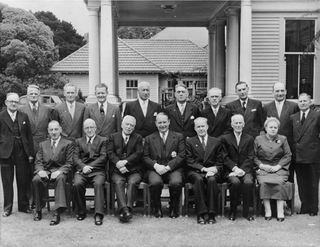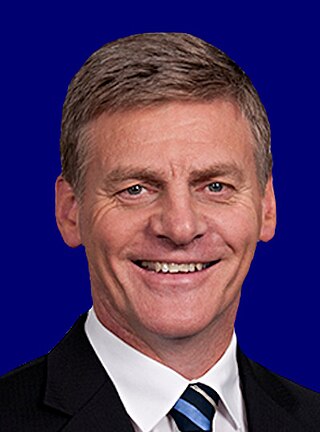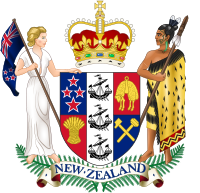
The economy of New Zealand is a highly developed free-market economy. It is the 52nd-largest national economy in the world when measured by nominal gross domestic product (GDP) and the 62nd-largest in the world when measured by purchasing power parity (PPP). New Zealand has a large GDP for its population of 5 million, and sources of revenue are spread throughout the large island nation. The country has one of the most globalised economies and depends greatly on international trade, mainly with Australia, China, the European Union, Japan, Singapore, South Korea, and the United States. New Zealand's 1983 Closer Economic Relations agreement with Australia means that the economy aligns closely with that of Australia.

Steven Maharey is a New Zealand academic and former politician of the Labour Party. Elected to Parliament for the first time in 1990, he was Minister of Social Development and Employment from 1999 to 2005 and Minister of Education from 2005 to 2007. He retired from Parliament at the 2008 general election to become the Vice-Chancellor at Massey University.

KiwiSaver is a New Zealand savings scheme which has been operating since 2 July 2007. Participants can normally access their KiwiSaver funds only after the age of 65, but can withdraw them earlier in certain limited circumstances, for example if undergoing significant financial hardship or to use a deposit for a first home.
The Ministry of Social Development (MSD) (Māori: Te Manatū Whakahiato Ora) is the public service department of New Zealand charged with advising the government on social policy, and providing social services.

The Second Labour Government of New Zealand was the government of New Zealand from 1957 to 1960. It was most notable for raising taxes on alcohol, cigarettes and petrol, a move which was probably responsible for the government lasting for only one term. It was headed by the Prime Minister Walter Nash.

The healthcare system of New Zealand has undergone significant changes throughout the past several decades. From an essentially fully public system based on the Social Security Act 1938, reforms have introduced market and health insurance elements primarily since the 1980s, creating a mixed public-private system for delivering healthcare.
The Fifth National Government of New Zealand was the government of New Zealand for three parliamentary terms from 19 November 2008 to 26 October 2017. John Key served as National Leader and Prime Minister until December 2016, after which Bill English assumed the premiership until the National Government's defeat following the October 2017 government-forming negotiations.
The Pharmaceutical Management Agency, better known as Pharmac, is a New Zealand Crown entity that decides, on behalf of Te Whatu Ora – Health New Zealand, which medicines and pharmaceutical products are subsidised for use in the community and public hospitals.

The Ministry of Business, Innovation and Employment is the public service department of New Zealand charged with "delivering policy, services, advice and regulation" which contribute to New Zealand's economic productivity and business growth.

The New Zealand budget for fiscal year 2013/14 was presented to the New Zealand House of Representatives by Finance Minister Bill English on 16 May 2013. This was the fifth budget English has presented as Minister of Finance.

The 2017 New Zealand general election took place on Saturday 23 September 2017 to determine the membership of the 52nd New Zealand Parliament. The previous parliament was elected on 20 September 2014 and was officially dissolved on 22 August 2017. Voters elected 120 members to the House of Representatives under New Zealand's mixed-member proportional (MMP) voting system, a proportional representation system in which 71 members were elected from single-member electorates and 49 members were elected from closed party lists. Around 3.57 million people were registered to vote in the election, with 2.63 million (79.8%) turning out. Advance voting proved popular, with 1.24 million votes cast before election day, more than the previous two elections combined.

The New Zealand budget for fiscal year 2016/17 was presented to the New Zealand House of Representatives by Finance Minister Bill English on 26 May 2016. It was the eighth budget English has presented as Minister of Finance, and the eighth budget of the Fifth National Government.
The property bubble in New Zealand is a major national economic and social issue. Since the early 1990s, house prices in New Zealand have risen considerably faster than incomes, putting increasing pressure on public housing providers as fewer households have access to housing on the private market. The property bubble has produced significant impacts on inequality in New Zealand, which now has one of the highest homelessness rate in the OECD and a record-high waiting list for public housing. Government policies have attempted to address the crisis since 2013, but have produced limited impacts to reduce prices or increase the supply of affordable housing. However, prices started falling in 2022 in response to tightening of mortgage availability and supply increasing. Some areas saw drops as high as around 9% - albeit from very high prices.

The Sixth Labour Government has governed New Zealand since 26 October 2017. It is headed by Chris Hipkins, the Labour Party leader and prime minister.

The New Zealand budget for fiscal year 2018/19 was presented to the New Zealand House of Representatives by Finance Minister Grant Robertson on 17 May 2018.

Budget 2019, dubbed the Wellbeing Budget, was the name given to the New Zealand budget for fiscal year 2019/20 presented to the New Zealand House of Representatives by Finance Minister Grant Robertson on 30 May 2019. This was the second budget presented by the Coalition Government. Its release was complicated by the accidental publication of budgetary documents on a test website two days prior to its official release on 30 May, attracting significant media and public attention.

Budget 2020, dubbed "Rebuilding Together", was the New Zealand budget for fiscal year 2020/21 worth NZ$50 billion, presented to the House of Representatives by Finance Minister Grant Robertson on 14 May 2020, the third budget presented by the coalition government of 2017–2020. This budget occurred during the COVID-19 pandemic in New Zealand and on the same day that the country exited the lockdown brought about by alert level 3.

Budget 2021 is the New Zealand budget for fiscal year 2021/22, presented to the House of Representatives by Finance Minister Grant Robertson on 20 May 2021 as the fourth budget presented by the Sixth Labour Government. This budget occurs after a year of several lockdowns due to the COVID-19 pandemic in New Zealand and focuses on economic recovery.

Budget 2022, dubbed the Wellbeing Budget 2022, is the New Zealand budget for fiscal year 2022/23, presented to the House of Representatives by Finance Minister, Grant Robertson, on 19 May 2022 as the fifth budget presented by the Sixth Labour Government. This budget was released in the midst of socio-economic impacts of the widespread community transmission of the SARS-CoV-2 Omicron variant, rising living costs, and the 2022 Russian invasion of Ukraine.

Budget 2023, titled "Support for today, Building for tomorrow", is the New Zealand budget for fiscal year 2023/24 presented to the House of Representatives by Finance Minister, Grant Robertson, on 18 May 2023 as the fifth budget presented by the Sixth Labour Government. The budget was released in the midst of rising living costs and recovery efforts following the 2023 Auckland Anniversary Weekend floods and Cyclone Gabrielle in January and February 2023.









